|
|
|
Sort Order |
|
|
|
Items / Page
|
|
|
|
|
|
|
| Srl | Item |
| 1 |
ID:
169413
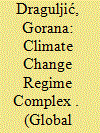

|
|
|
|
|
| Summary/Abstract |
In an era defined by forum shopping, institutional proliferation, and regime complexity, why do global governance arrangements remain relatively stable? This article combines the insights of regime complexity scholarship with historical institutionalism to address this question. It argues that the establishment of international regimes creates winners and losers. States dissatisfied with these arrangements push for institutional change. Regimes nonetheless tend to develop in a path-dependent manner because institutions are resistant to change and the winners under the status quo seek to protect it. Thus, existing governance arrangements exert a centripetal pull, even when states engage in forum shopping and institutional proliferation to generate regime complexity. An examination of path-dependent institutional development in the global climate regime supports the argument.
|
|
|
|
|
|
|
|
|
|
|
|
|
|
|
|
| 2 |
ID:
177846
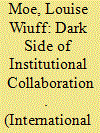

|
|
|
|
|
| Summary/Abstract |
Within the field of international peace and security, policy makers and analysts alike commonly treat collaboration and convergence among international organizations and intervention frameworks as a policy objective in itself. Indeed, from the focus on the ‘comprehensive approach’, during the 2000s, to the recent emphasis on multi-dimensional and integrated stabilization frameworks, institutional collaboration is cast as inherently positive and desirable in regard to addressing international collective matters. This article challenges such ‘collaboration bias’. It does so by exploring the empirical effects of increasing collaboration and ‘strategic partnerships’ within the context of the current (re)turn to stabilization interventions. Specifically, focusing on Mali, it unpacks how contemporary stabilization efforts intensify collaboration across counterterrorism and peacekeeping interventions in ways that undercut policy implementation within one of the most central peacekeeping priority areas, namely the Protection of Civilians (PoC). In detailing key aspects on which contemporary peacekeeping-counterterrorism entanglements compromise protection efforts, the article conveys some of the ‘dark sides’ of cooperation regimes. It moreover highlights the need to not only explore regime complexity as a systemic feature of world politics but also unpack how it operates, and to what effect, at the meso and micro levels of policy implementation and practice.
|
|
|
|
|
|
|
|
|
|
|
|
|
|
|
|
| 3 |
ID:
154468
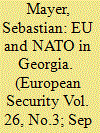

|
|
|
|
|
| Summary/Abstract |
Focusing on fragile Georgia since the early 2000s, the article takes a country-centred perspective on EU–NATO inter-organisationalism. It outlines the regional strategies of these core Western security institutions and assesses their complementarity and overlap across three sets of tasks: defence and empowerment, crisis management, and security sector reform. While there is hardly functional overlap in the first and second sets, in the third the EU and NATO intersect to a considerable degree. Also, there is no significant inter-organisational cooperation over Georgia. One key conclusion is that while field-level overlap clearly jeopardises institutional effectiveness, overlapping toolboxes – as in crisis management – allow for institutional flexibility when one international organisation setting offers reputational or practical advantages. Against this backdrop, a case can be made contra propositions of merging the Common Security and Defence Policy and NATO.
|
|
|
|
|
|
|
|
|
|
|
|
|
|
|
|
| 4 |
ID:
137240
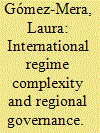

|
|
|
|
|
| Summary/Abstract |
In recent years, the Americas have witnessed an unprecedented surge in the number and scope of regional integration agreements, resulting in a complex “spaghetti bowl” of trade and economic relations. What are the consequences of this proliferation of overlapping and parallel institutional commitments among countries in the region? How has this increasing regime complexity affected the dynamics of cooperation among Latin American countries? And what does the case of overlapping regional agreements in the Americas tell us about the effects of regime complexity on regional governance? Drawing on the literature on international regime complexity, I identify three mechanisms through which the proliferation of regional agreements have undermined the effectiveness of cooperation in the Americas: by introducing legal fragmentation and rule ambiguity; by facilitating cross-institutional political strategies that allow countries to behave in opportunistic ways; and through competition and other feedback effects that work to erode regional unity. The article has implications for two broader literatures in international relations: work on international regime complexity and scholarship on regionalism and regional trade agreements.
|
|
|
|
|
|
|
|
|
|
|
|
|
|
|
|
| 5 |
ID:
193478


|
|
|
|
|
| Summary/Abstract |
This article broadens the understanding and empirical study of regime complexes by shifting the focus from the negotiation outcome to the processes of negotiating new international agreements. Although they are important to regime-complex formation and delimitation, the sites where states negotiate new agreements are rather neglected. We aim to enhance the methodological toolbox available to scholars studying global governance in two ways: (1) by demonstrating how dynamic relationships between states and international organisations (IOs) unfolding within the social space of international treaty negotiations contribute to regime-complex formation; and (2) how social network analysis (SNA) can help us to detect patterns in these relationships. Combining participant observation and collaborative event ethnography (CEE) with social network analysis, we present new empirical material illustrating how we delimited a regime complex and how IOs interact throughout the negotiation process. We applied our methodology to the case of marine-biodiversity governance and use observational data collected during three intergovernmental conferences (IGCs) (2018–19) on a new treaty for the conservation and sustainable use of marine biodiversity beyond national jurisdiction (BBNJ) for our analysis. We discuss the results in relation to our approach’s strengths and weaknesses and implications for future research on regime complexity.
|
|
|
|
|
|
|
|
|
|
|
|
|
|
|
|
| 6 |
ID:
181672


|
|
|
|
|
| Summary/Abstract |
International organizations (IOs) increasingly pool resources and expertise. Under what conditions do they pool rather than compete when their activities overlap? Drawing on elite interviews, I argue that even though many cooperation decisions are made by staff possessing high degrees of autonomy from member state principals, IOs are more likely to pool resources when their leading stakeholders are geopolitically aligned. Regardless of whether member states directly oversee the negotiation of these arrangements, staff design policies that are amenable to major stakeholders. I test this argument with regression analysis of an original data set that documents patterns of co-financing and information sharing among IOs in the development issue area. I further supplement these tests with an elite survey experiment deployed via LinkedIn to bureaucrats from various development IOs. Across the board, I find evidence consistent with my theory.
|
|
|
|
|
|
|
|
|
|
|
|
|
|
|
|
| 7 |
ID:
190057
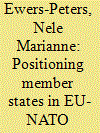

|
|
|
|
|
| Summary/Abstract |
With the growing density and the plethora of security organisations on the regional and international level, the research programme on interorganisational relations has received increasing scholarly attention. The complexity of European security – in light of the Ukraine conflict since 2014, Russia’s more assertive foreign policy behaviour, and on-going crisis management operations in the Africa, the Mediterranean Sea and Middle East – has revived EU-NATO cooperation. The analysis from the perspective of member states and how they can be positioned in the EU-NATO interorganisational relations, however, has received little exploration. This article, therefore, addresses the roles and positions of member states within the relations between the EU and NATO as Europe’s prime security organisations. Member states have numerous political strategies at their disposal to trigger, strengthen or obstruct interorganisational relations, ranging from forum-shopping to hostage-taking and brokering. Drawing on insights from regime theory, network analysis, organisation theory and interorganisationalism, this article proposes a typology of member states in EU-NATO cooperation. Against the backdrop of this special relationship, the typology is developed which aims to detect and illustrate member states’ positions and strategies.
|
|
|
|
|
|
|
|
|
|
|
|
|
|
|
|
| 8 |
ID:
117943


|
|
|
|
|
| Publication |
2013.
|
| Summary/Abstract |
The existing literature on regime complexity has generally focused on its impact on the behavior of states; in contrast, this article explores its implications for international organizations. Many organizations within the UN system were established in the aftermath of World War II, at a time when they held a de facto monopoly in a given policy field. Gradually, however, institutional proliferation has created a range of institutional overlaps that may have complementary or competitive relationships to the referent organization of the original regime. Developing the concept of challenged institutions, this article explores how international organizations are affected by and strategically respond to growing institutional competition. Through a case study of the Office of the UN High Commissioner for Refugees' response to an increasingly competitive institutional environment, it argues that the concept of challenged institutions highlights the dilemmas faced by multilateral organizations in a rapidly changing landscape of global governance.
|
|
|
|
|
|
|
|
|
|
|
|
|
|
|
|
| 9 |
ID:
117941
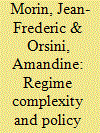

|
|
|
|
|
| Publication |
2013.
|
| Summary/Abstract |
This article looks at regime complexes from a state policymaking perspective. It develops a theoretical model in which regime complexes become
denser over time while governmental policymaking becomes more coherent. Underthis model, interactions between globalregime complexes and
national policymaking are twofold. On the one hand, greater policy coherence generates negotiated mandates asking for regime connections
and complex density. On the other hand, regime-complex density creates
more cohesive audiences, which increase incentives for national policy coherence. This co-adjustments model bringsstatesinto the discussion ofinstitutional interactions and critically questions the desirability and
feasibility of recent calls for joined-up government and whole-of-government approaches.
|
|
|
|
|
|
|
|
|
|
|
|
|
|
|
|
| 10 |
ID:
169076
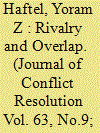

|
|
|
|
|
| Summary/Abstract |
The proliferation and scope expansion of regional organizations (ROs) is one of the most prominent features in contemporary international politics. In particular, many regional economic organizations (REOs) have expanded into the security realm. This trend has often resulted in an overlap with regional security organizations (RSOs) already in place. This study sheds light on this phenomenon by identifying the conditions under which REOs trespass into the security policy domain despite the fact that preexisting RSOs already fulfill security functions. We argue that the presence of strategic rivalries is an important driver of the creation and depth of organizational overlap through scope expansion. Specifically, RSOs that include significant interstate rivalries propel a subgroup of like-minded states to advance and deepen security cooperation through their existing REOs. Using an original data set of security cooperation within economic and security ROs and a quantitative analysis, we find substantial support for this argument.
|
|
|
|
|
|
|
|
|
|
|
|
|
|
|
|
| 11 |
ID:
193225


|
|
|
|
|
| Summary/Abstract |
When a state is dissatisfied with an international institution it has different strategies available to it to secure change. These strategies are increasingly well understood due to research in the areas of regime complexity and institutional selection. But while there is an understanding of how the structure of a regime can influence the chances of success of different change proposals, there is less clarity on how the content of proposed changes impacts their success. In this article we decompose proposed institutional changes into two sub-types: Status-quo challenging and status-quo enhancing. Status-quo enhancing changes promote reforms that advance the objectives of the existing regime and so serve to drive change that would otherwise be limited by the inertia of existing institutions. Conversely, status-quo challenging changes undermine the stated goals of the existing regime. We develop these sub-types by comparing China’s attempts to secure changes in the global finance and trade regimes and find that for China status-quo enhancing changes have met with more success than status-quo challenging approaches because they have created more opportunities for productive coalition building.
|
|
|
|
|
|
|
|
|
|
|
|
|
|
|
|
|
|
|
|
|